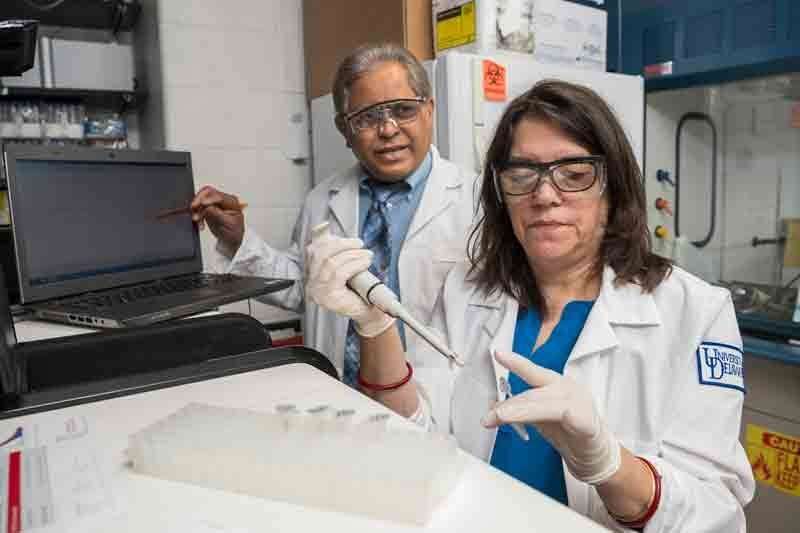DNA replication in HPV

A pair of researchers from the University of Delaware Department of Medical and Molecular Sciences are investigating genetic variations in DNA replication of human papillomaviruses (HPV) and its correlation with HPV-related cancers. UD's Esther Biswas-Fiss and Subhasis Biswas—and their former doctoral student, Dr. Gulden Yilmaz (currently at Arcus Medica, PA) recently published their findings in Biochimica et Biophysica Acta – General Subjects. The paper illustrated specific changes in DNA sequences in HPV that correlate with cancer prognosis.
"Some strains (low-risk) of the virus infect human cells—proliferating in the cell's cytoplasm remaining benign," said Esther Biswas-Fiss, chairperson and professor for the Department of Medical and Molecular Sciences. "Alternatively, other [high-risk] strains of HPV can integrate into the genomic DNA of the host. When that happens, it results in cancer because the host's tumor prevention mechanisms are shut down by the viral proteins."
The UD researchers have worked on DNA replication in bacteria and human cells for a long time, but a discussion with Joseph Curry, a head and neck surgeon at Thomas Jefferson University, sparked their interest in HPV and cancer.
"He brought to our attention that several squamous cell carcinomas are associated from HPV infection, which piqued our interest into HPV related carcinogenesis," said Professor Subhasis Biswas.
Accounting for approximately four percent of all cancers in the United States, head and neck cancers include cancers of the mouth, throat, nose, sinuses, salivary glands and middle ear. Historically, the most common driver of head and neck cancers was tobacco use. With U.S. declines in smoking rate, HPV, which is the most common sexually transmitted infection, climbed to the top position. Centers for Disease Control and Prevention data on the prevalence of HPV in American adults is alarming and has a broader age range than you might expect.
"HPV is not one virus; it is a family of viruses," said Subhasis Biswas. "Fortunately, most forms of HPV are benign. However, certain HPV strains can cause cancer."
So what makes some of these forms of HPV so deadly? The research concluded that the altered DNA replication mechanism of the high-risk viruses makes them lethal. Specific DNA footprints that point to their oncogenicity were identified in their research.
"A person could be infected by a cancer-causing strain of HPV for years and not develop cancer until later on down the road," explained Esther Biswas-Fiss.
Developing cancer screenings
A single strain of HPV is enough to cause worry, but many people are infected with multiple strains. Soon on the horizon, Esther sees a time where medical laboratory professionals can quickly test individuals to see if this carcinogenic molecular signature of HPV is present and develop appropriate strategy of treatment.
"If so, medical professionals could closely monitor those people for head and neck cancer," she said.
The study mapped the exact sequence changes that drive the change to carcinogenicity. This finding is directly translatable into future screenings. With cervical cancer, most people make the connection between the cancer and HPV infection—not the case for head and neck as well as other HPV-origin cancers.
"We have a rapid screening tool for cervical cancer—a pap smear. But we have work to do when it comes to head, neck and other cancers," said Esther Biswas-Fiss. "So knowing the molecular signature of the oncogenic strains of HPV paves the way for more accurate diagnostic tests and, hopefully, more rapid screening tests."
In the same vein as a pap smear, medical laboratory professionals could analyze cells from a swab-based, molecular test—picking up DNA sequences of carcinogenic HPVs.
More information: Gulden Yilmaz et al. Genetic variations in the DNA replication origins of human papillomavirus family correlate with their oncogenic potential, Biochimica et Biophysica Acta (BBA) - General Subjects (2017). DOI: 10.1016/j.bbagen.2017.12.010
Provided by University of Delaware



















